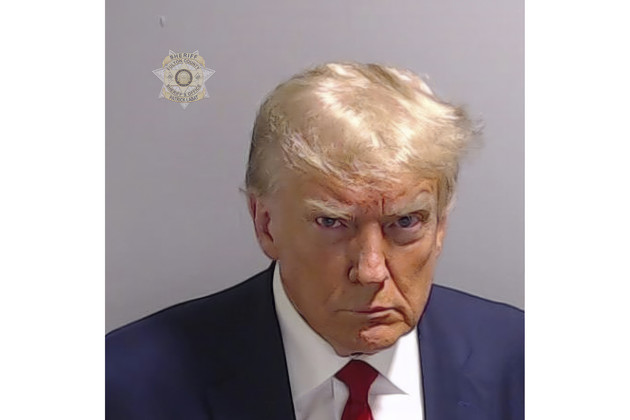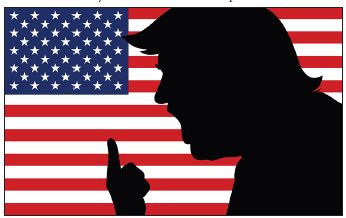Donald Trump may speak in incoherent pseudo-sentences that go on and on, never quite reaching completion, let alone a point. You may question how anyone can believe he’s sincere when his primary objective seems to be professing his self-declared greatness. Yet, many people love him. To those people, he represents the strong man who tells the truth, who’s not afraid to be mean, who won’t stand for the libs and their wokeness.
And thanks to a successful propaganda campaign by Trump and conservative media, three of every four Republicans now believe the conspiracy theory that Trump won the 2020 election and nearly half approve of the Capitol riots. Recently, Trump was indicted on several counts, yet his people either don’t believe it or excuse it as a witch hunt.
“Donald Trump has conditioned … a pretty serious majority of the Republican base to believe that any legal critique of him, any external charge made against him is invalid and a product of the ‘deep state’ or a conspiracy of some kind to take him away from Republican voters,” said Rick Wilson, co-founder of the anti-Trump Lincoln Project in a recent interview with CNN. “And … when you accuse Donald Trump of being a criminal, even with all the evidence in the world, their response is, ‘No, he’s not. You’re the one who’s doing this.’”
And it’s not just his base; his Republican colleagues and even primary opponents have either defended him or been silent on the recent indictments. Because to challenge Trump is to put oneself on the chopping block, and no one wants to do that. Such is the power of Trumpism.
What is Trumpism?
According to Open Democracy, “Trumpism is the extreme far-right ideology that attacks democracy and normalizes violence against progressive agendas and liberal cultures, while promoting full market deregulation.”
For the purposes of this article, we’ll say Trumpism is the set of political ideologies, style of governance, programs, policies and beliefs held by, implemented by, or promoted by Donald Trump and his supporters in order to gain and keep control of power.
These are some of the ideas associated with Trumpism: Nationalism, nativism, social conservatism, extremism, polarization, gun violence, brainwashing, conspiracies, white supremacy, anti-choice, anti-gay, anti-trans, homophobia, neo-nationalism, climate change denial, religious bigots, religious zealots, disenfranchisement, extreme gerrymandering, and much more.
Trump’s core constituency is clear: Republican whites, particularly men, and especially those who didn’t go to college. Many of these Trumpists feel aggrieved by the globalization of manufacturing, the advancement of civil rights for people of color and LGBTQ folks, and the rise in ethnic diversity of our populace. They found in Donald Trump a kindred spirit, one who would not just tolerate their hatred of marginalized groups, but also encourage it, under the guise of freedom of speech.
A component of Trumpism (and a reason so many stand by Trump) is his ability to convey shared grievances to his supporters. Trumpism only works if there’s a sense of being constantly under attack, and being the underdog in that attack, even when reality is quite different. Defensiveness is the implicit justification for everything else. (You don’t have a job? It’s because of immigrants. Democrats want open borders. Your kid goes to school with gender-nonconforming students? Your religious freedom is being trampled, etc.) Trump is a marvelous liar and truth-stretcher, and his base loves the idea of finally “owning the libs” after decades of enduring political correctness.
Here’s what happened while Trump was in office:
As president, Trump pursued sizable income tax cuts (benefiting mostly the wealthy), corporate deregulation, increased military spending, rollbacks of federal healthcare protections, and the appointment of conservative judges consistent with conservative policies. He minimized the separation of church and state by assuring white Christian nationalist evangelicals that he would embrace their agenda.
He also oversaw building or expanding a border wall, separating immigrant children from their parents, imposed tough new immigration restrictions, and a ban on immigrants from specific (Muslim) countries. He ignored Black Lives Matter concerns in favor of a militarized police response. He oversaw a pandemic in which a million people lost their lives, millions more were negatively impacted by an economic recession, and he discredited scientists working on solutions by promoting conspiracy theories.
In addition, he approved gas and oil pipelines, removed protections from federal lands, cut environmental regulations, and backed out of the Paris international climate change accord. He also buddied up with Israel and launched a trade dispute with China.
Under Trump we saw real harm done, especially to marginalized minority groups and low-income people. And even without Trump in power, his influence lives on in the form of extreme policies designed to further a right-wing agenda rooted in racial and religious bigotry.
Following his presidency, and perhaps as a result of what they perceive as Democrats gunning for Trump, state legislators across the country enacted ultra-conservative policies targeting some of our most vulnerable populations: transgender people and women in general. For those of us in states with conservative legislatures, the effect has been a devastating reduction or elimination of our civil rights.
This onslaught is not likely to let
up any time soon, especially if we watch passively. The danger will not resolve
itself. It will take many of us calling out racism, homophobia, bigotry,
misogyny and other forms of discrimination in our government and in our
communities. It will take many of us standing up to corporate polluters and
climate deniers. It will take many of us working together to create a better
world.
